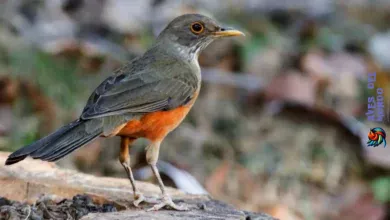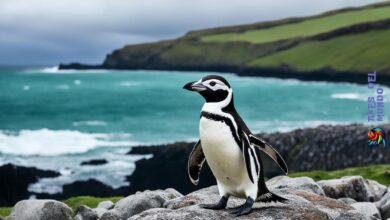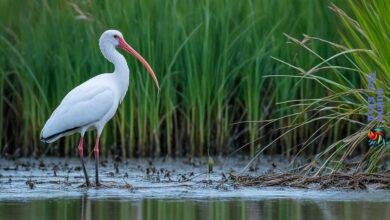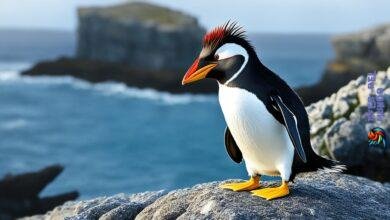Did you know that pigeons have a surprisingly varied diet? These birds, whether wild or domesticated, rely on a diverse range of foods to survive. From seeds and small insects to even small lizards, pigeons are true omnivores. Their feeding habits and nutritional needs are fascinating, and understanding what pigeons eat can help us provide a healthy diet for these remarkable creatures.
The Diet of Urban Pigeons
Pigeons in urban areas have successfully adapted to thrive in cities and towns. They eat a wide range of food, including leftovers that humans throw away. Common foods that urban pigeons consume include bread, pasta, meat, fish, and confectionary items. However, relying on human food sources can be detrimental to their health, as they may consume contaminated or harmful substances.
To understand the diet of urban pigeons better, let’s take a closer look at the foods they commonly consume:
«Pigeons are opportunistic eaters and will scavenge for food in various environments. In cities, they have learned to take advantage of the abundance of food sources, including scraps discarded by humans. This enables them to survive and thrive in urban areas.»
Popular Food Choices for Urban Pigeons
Pigeons in cities have adapted to finding sustenance amid the bustling human environment. These birds have learned to take advantage of the readily available food sources in urban areas. While urban pigeons have a diverse diet, their common food preferences include:
- Bread and bread crumbs
- Pasta and rice
- Meat pieces and leftovers
- Fish scraps and discarded fish
- Confectionary items like cookies and cakes
Urban pigeons often scavenge for these food items in public parks, markets, and near outdoor dining areas where humans frequently discard food. This opportunistic feeding behavior has allowed pigeons to adapt and thrive in urban environments.
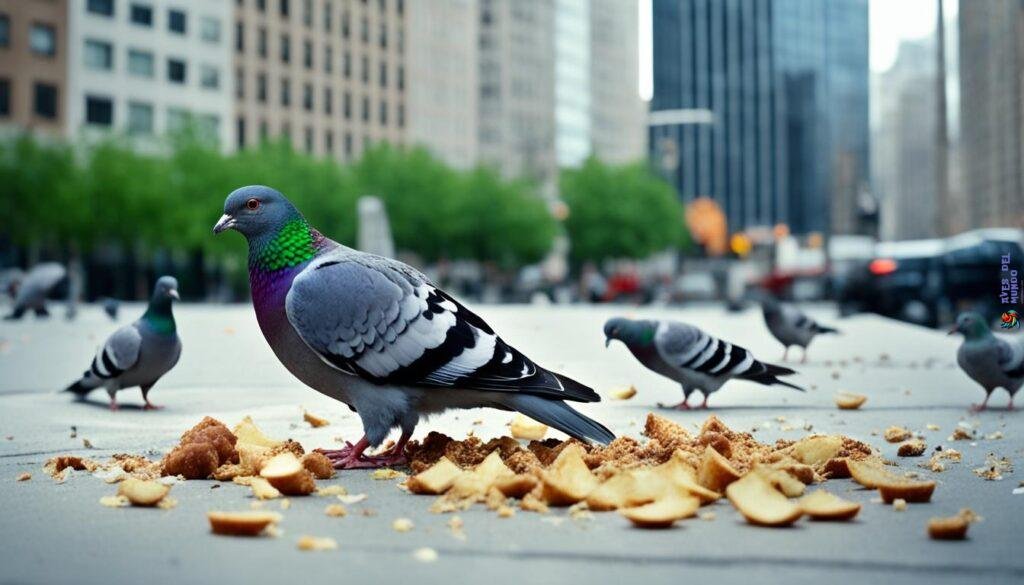
While urban pigeons have developed a taste for human foods, it is important to note that their natural diet is different. Pigeons are primarily vegetarians and, in their natural habitat, have access to a wider variety of seeds, fruits, berries, and vegetation. Their reliance on human food sources can lead to nutritional imbalances and potential exposure to harmful substances present in processed and discarded foods.
| Advantages of Urban Pigeon Diet | Disadvantages of Urban Pigeon Diet |
|---|---|
|
|
Wild Pigeon Diet
In their natural habitats, wild pigeons have a more diverse diet. They primarily feed on berries, seeds, grains, nuts, vegetables, and vegetation. Additionally, they consume grit for digestion purposes and depend on fresh water sources for hydration. While herbivorous by nature, wild pigeons may also eat insects, spiders, and even lizards if food is scarce. Their diet requires a balance of protein, fat, and other nutrients to maintain their health.
Wild pigeons thrive on a natural and varied diet that includes a combination of fruits, vegetables, and seeds. Berries, such as strawberries and blueberries, provide essential antioxidants and vitamins. Grains, like corn and wheat, offer carbohydrates for energy. Nuts, such as almonds and pistachios, are a good source of healthy fats. Vegetables like leafy greens and carrots are rich in vitamins and minerals.
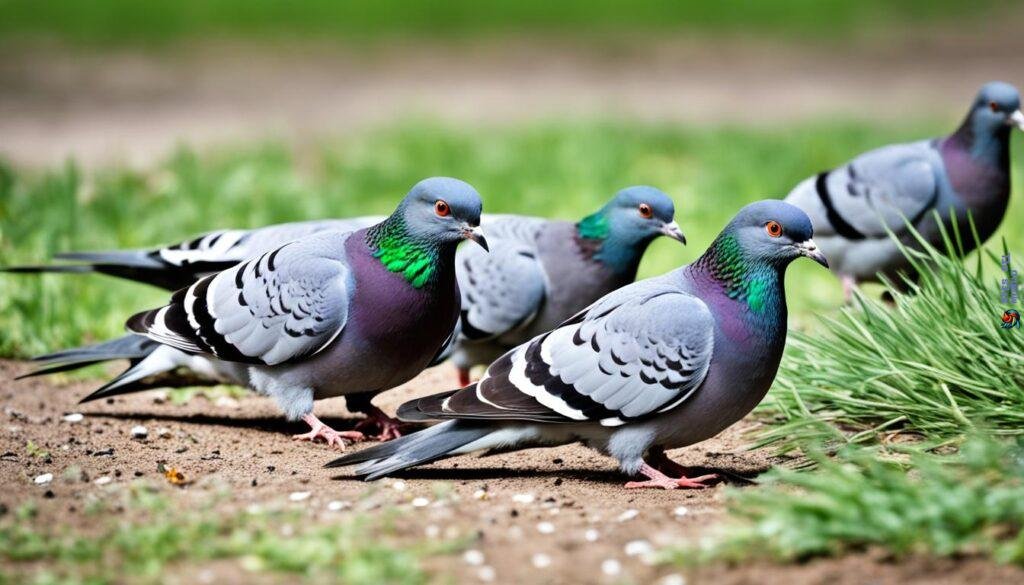
Wild pigeons have adapted to a diverse range of environments, and their diet reflects their ability to source food from various sources in the wild. They are opportunistic feeders, taking advantage of the abundance of natural resources available to them.
Grit is an important part of a wild pigeon’s diet as it aids in digestion. Pigeons consume small, hard stones or grit that help break down food in their gizzard, a specialized organ for grinding food. The grit also provides essential minerals and aids in the absorption of nutrients.
Fresh water sources are crucial for wild pigeons to stay hydrated and maintain their overall health. They rely on rivers, streams, ponds, and other natural water bodies to quench their thirst and stay cool during hot weather.
While the natural pigeon diet consists mainly of plant-based foods, wild pigeons may occasionally supplement their diet with insects, spiders, and small lizards. This adaptation allows them to survive and find alternative food sources when their primary food supply is limited.
Benefits of a Natural Pigeon Diet:
- Provides essential nutrients: A diet rich in berries, seeds, grains, and vegetables ensures that wild pigeons receive a balanced intake of vitamins, minerals, and other essential nutrients.
- Promotes energy and vitality: The diverse array of food options in the wild pigeon’s diet provides them with the necessary energy to fly, explore their surroundings, and engage in other activities essential to their survival.
- Maintains overall health: A natural diet contributes to the growth, development, and overall well-being of wild pigeons, allowing them to maintain healthy feathers, strong bones, and a robust immune system.
Feeding Baby Pigeons
Baby pigeons, also known as pigeon chicks, have unique dietary needs during their early stages of development. They rely on a special substance called crop milk, which is secreted by both parents, to provide them with essential nutrients for growth. This crop milk is a nutrient-rich liquid that plays a vital role in nourishing the baby pigeons.
During the first week of their lives, baby pigeons solely depend on crop milk for their nutrition. The crop milk contains proteins, carbohydrates, fats, and other essential nutrients necessary for their rapid growth and development. It serves as their complete diet during this initial stage.
After the first week, baby pigeons can begin to eat other foods in addition to crop milk. They slowly transition from solely consuming crop milk to incorporating crushed foods into their diet. The presence of crop milk aids in their digestion and helps them adapt to solid foods.
By the time baby pigeons reach one month of age, they are fully capable of consuming a variety of foods and are ready to leave their nests to start foraging on their own. At this stage, they can safely eat a diet similar to adult pigeons, which includes seeds, grains, fruits, and vegetables.
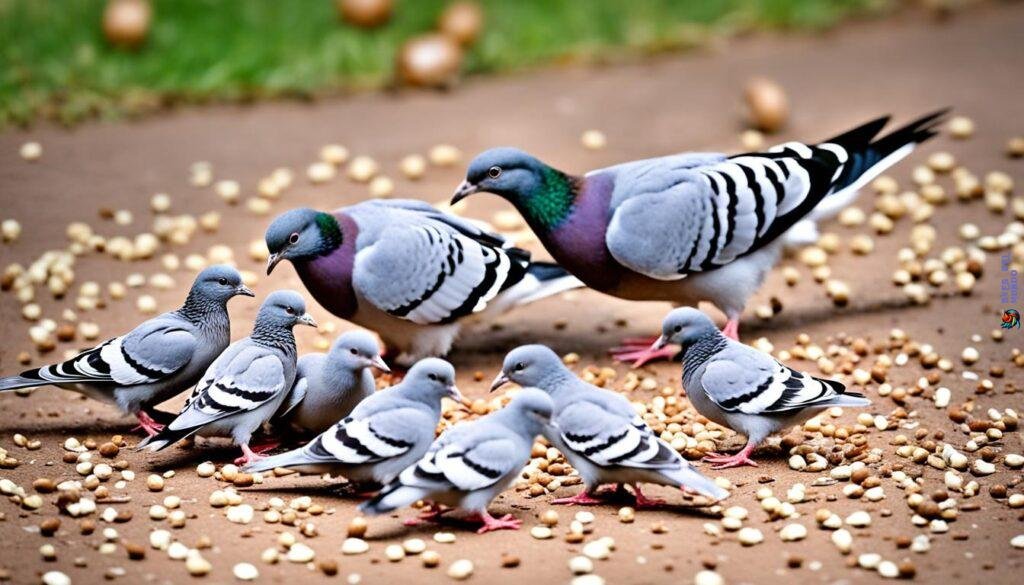
Feeding baby pigeons is a crucial task that requires careful attention. Here are some key points to remember:
- During the first week, baby pigeons should be exclusively fed crop milk provided by both parents.
- After one week, introduce crushed foods to their diet while still offering crop milk for easier digestion.
- By one month, they can safely consume a variety of pigeon food and no longer rely solely on crop milk.
It’s important to ensure that the diet of baby pigeons is nutritionally balanced and provides them with the necessary nutrients for healthy growth and development.
Proper Nutrition for Pigeons and Doves
Proper nutrition is crucial for pigeons and doves to maintain their health. These birds require a balanced diet that includes carbohydrates, proteins, fats, vitamins, minerals, and water. Providing them with a well-rounded nutrition plan ensures their overall well-being and supports their natural bodily functions.
Commercially available pigeon diets are an excellent choice for meeting their nutritional needs. These diets typically consist of a mixture of seeds and grains that mimic their natural food sources. To enhance the nutrient intake, you can supplement their diet with pellets specially formulated for pigeons and doves. The pellets are enriched with essential vitamins and minerals, providing a more comprehensive nutrition profile.
In addition to seeds, grains, and pellets, it is essential to incorporate fresh fruits, vegetables, and greens into their daily diet. These natural food items provide important nutrients, antioxidants, and fiber that contribute to their overall health. Fruits like berries and apples, and vegetables like leafy greens and carrots, are excellent choices for birds’ nutrition.
A balanced diet also includes providing clean water at all times. Hydration is crucial for a bird’s overall well-being and supports proper digestion and metabolism. Fresh and clean water must be easily accessible to pigeons and doves throughout the day.
Creating a well-balanced diet for pigeons and doves not only supports their physical health but also contributes to their mental and emotional well-being. By providing them with a diverse range of foods, you can mimic their natural foraging habits, promoting natural behaviors and optimal health.
Key Points:
- Pigeons and doves require a balanced diet of carbohydrates, proteins, fats, vitamins, minerals, and water.
- Commercially available pigeon diets supplemented with pellets ensure comprehensive nutrient intake.
- Fresh fruits, vegetables, and greens are essential for providing additional vitamins, minerals, and antioxidants.
- Clean water must be available at all times to support hydration and proper bodily functions.
| Nutrient | Food Sources |
|---|---|
| Carbohydrates | Seeds, grains, pellets |
| Proteins | Seeds, grains, pellets, insects |
| Fats | Seeds, nuts, avocados (in moderation) |
| Vitamins and Minerals | Fruits, vegetables, greens |
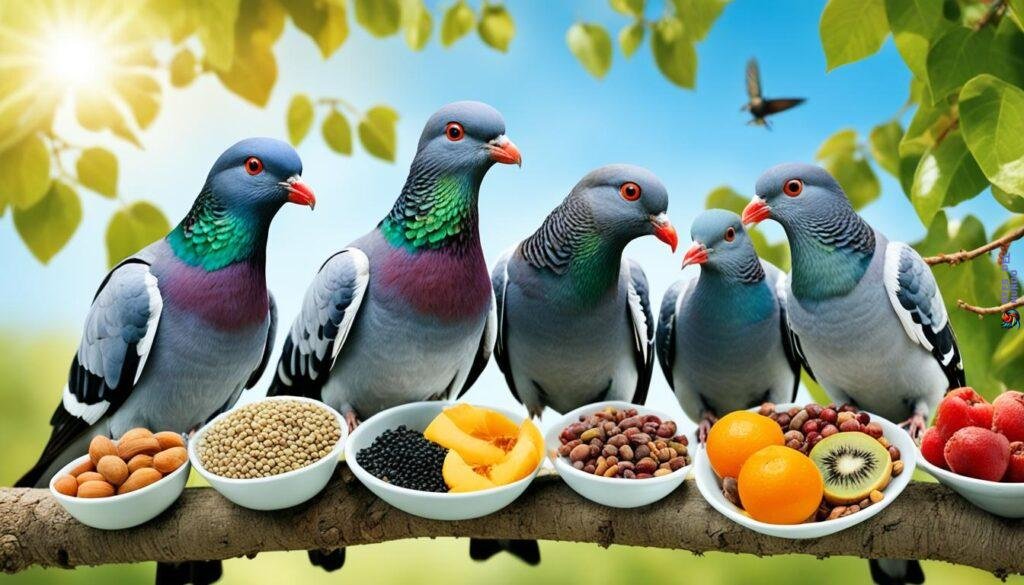
Foods to Avoid Feeding Pigeons
Pigeons should be provided with a diet that promotes their health and well-being. However, there are certain foods that can be harmful or toxic to these birds and should be avoided. Remember that pigeons have specific nutritional requirements, and feeding them the wrong foods can have negative consequences. Here are some foods that you should refrain from feeding pigeons:
- Foods high in sugar: Pigeons should not consume sugary foods such as candy, soda, or sweet pastries. Excessive sugar intake can lead to obesity and other health issues.
- Apple seeds: Apple seeds contain a compound called amygdalin, which releases cyanide when ingested. It is best to remove the seeds before offering apples to pigeons.
- Chocolate: Chocolate contains theobromine and caffeine, which are toxic to pigeons. Even small amounts of chocolate can cause severe health problems for these birds.
- Foods high in salt: Pigeons have specific dietary salt requirements, and a diet high in salt can disrupt their electrolyte balance. Avoid feeding them salty snacks or processed foods.
- Avocados: Avocados contain a substance called persin, which is toxic to birds. Feeding avocados to pigeons can lead to respiratory distress and even death.
- Caffeine-containing products: Pigeons should not consume any products that contain caffeine, such as coffee, tea, or energy drinks. Caffeine can have detrimental effects on their cardiovascular system.
While some people claim that feeding rice to pigeons can cause harm, this is actually a myth. Pigeons can safely consume rice without any negative effects. However, it is still recommended to prioritize foods that are nutritionally valuable rather than offering empty calories.
«Feeding pigeons the wrong foods can have detrimental effects on their health and well-being. It is important to be aware of the foods that can be harmful or toxic to these birds.»
Feeding Tips for Pigeons
When providing food for pigeons, it is essential to ensure their safety and nutrition. Here are some feeding tips to keep in mind:
- Always offer fresh and clean water for pigeons to drink. Clean the water dish regularly and replace the water daily.
- Include a variety of fresh fruits and vegetables in their diet to provide essential vitamins and minerals.
- Monitor their food intake and avoid overfeeding. Pigeons should have access to food throughout the day but should not be allowed to become overweight.
- Do not offer junk food, chocolate, salty snacks, caffeine-containing beverages, or alcoholic beverages to pigeons.
- If a pigeon rejects a certain food, try offering it again at a later time. Pigeons may sometimes be hesitant to try new foods.
«Proper feeding practices can help ensure that pigeons receive the nutrition they need without risking their health. By following these feeding tips, you can contribute to the well-being of these fascinating birds.»
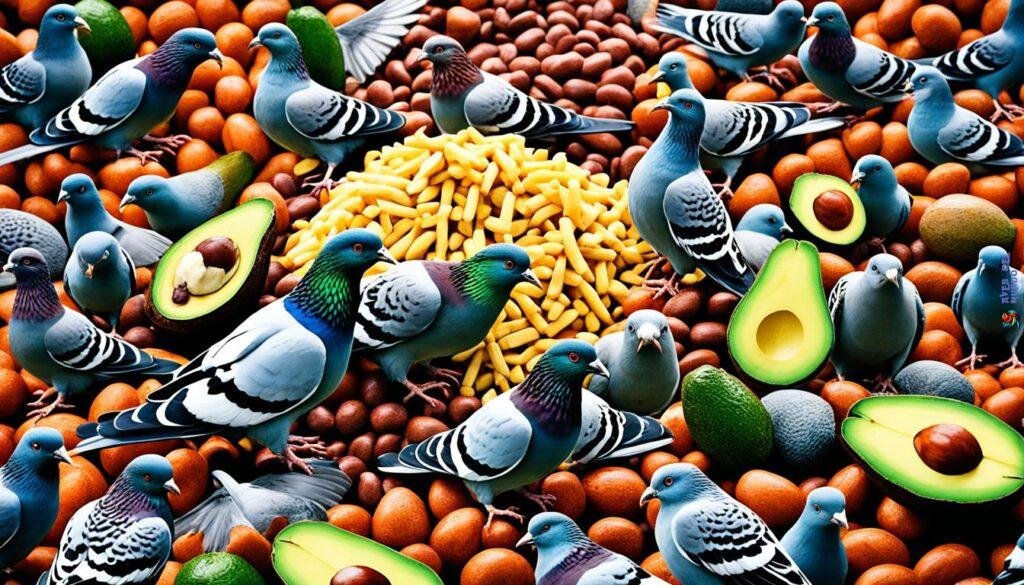
Special Dietary Needs for Pigeons and Doves
Pigeons and doves may have specific nutritional requirements during certain life stages, such as breeding or egg-laying. It is important to address their special dietary needs to ensure their overall health and well-being.
Consulting with a veterinarian who specializes in avian care is highly recommended to determine the appropriate supplements or diet modifications for pigeons and doves. A veterinarian can assess the birds’ specific needs and provide tailored recommendations to support their unique dietary requirements.
While birds on a pellet-based diet generally receive a well-rounded nutritional profile, additional supplements may be necessary in certain cases. Calcium supplementation, for example, may be required for birds that are determined to be calcium-deficient.
Avian specialists can also advise on the appropriate feeding practices during specific life stages. For example, during breeding or egg-laying periods, providing a nutrient-dense diet that includes high-quality proteins and ample calcium is essential to support optimal reproductive health and the healthy development of eggs and chicks.
By seeking professional guidance, bird owners can ensure that their pigeons and doves receive the necessary nutrients to thrive and lead healthy lives.
Consultation with a Veterinarian for Special Dietary Needs
When considering the special dietary needs of pigeons and doves, a consultation with a veterinarian who specializes in avian care is crucial. They can provide expert advice and guidance specific to the birds’ individual requirements.
| Special Dietary Needs | Key Considerations |
|---|---|
| Breeding and Egg-Laying | High-quality proteins Calcium-rich diet Nutrient-dense food Supplements as needed |
| Calcium Deficiency | Consultation with a veterinarian Calcium supplementation as recommended Diet modifications to address deficiency |
Tips for Feeding Pigeons and Doves
When it comes to feeding pigeons and doves, it’s important to ensure they receive a balanced and nutritious diet. Here are some helpful tips to keep in mind:
1. Monitor Food Intake: Keep an eye on how much food your pigeons and doves consume. Offer them a variety of foods, including seeds, grains, pellets, fruits, and vegetables. Observing their eating habits will help you determine if they are getting enough nourishment.
2. Fresh Water is Essential: Provide a constant supply of fresh, clean water for your feathered friends. Change their water dishes daily and ensure they have access to it at all times. Water is crucial for their overall health and digestion.
3. Offer Wholesome Human Foods: Occasionally, you can offer small quantities of wholesome human foods as treats for your pigeons and doves. They can enjoy bits of cooked rice, whole grains, and leafy greens. However, avoid giving them any junk food, chocolate, salty foods, caffeine, or alcoholic beverages.
By following these feeding recommendations, you can ensure that your pigeons and doves receive the nutrition they need to stay healthy and happy. Remember to clean their food and water dishes regularly and be patient if they reject certain foods – they may change their preferences over time.
